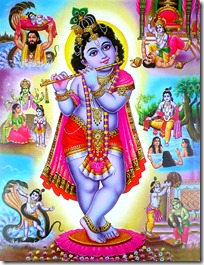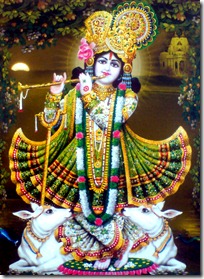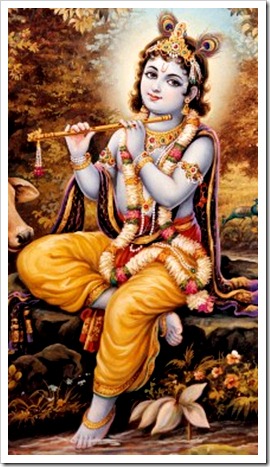 “The sound Krishna and the original Krishna are the same. When we chant Hare Krishna and dance, Krishna is also dancing with us. Of course we may say, ‘Well, I do not see Him,’ but why do we put so much stress on seeing? Why not hearing? Seeing, tasting, smelling, touching, and hearing are all instruments for experience and knowledge. Why do we put such exclusive stress on seeing?” (Shrila Prabhupada, Raja-vidya, Ch 2) “The sound Krishna and the original Krishna are the same. When we chant Hare Krishna and dance, Krishna is also dancing with us. Of course we may say, ‘Well, I do not see Him,’ but why do we put so much stress on seeing? Why not hearing? Seeing, tasting, smelling, touching, and hearing are all instruments for experience and knowledge. Why do we put such exclusive stress on seeing?” (Shrila Prabhupada, Raja-vidya, Ch 2)If someone were to present us a fresh pizza pie, which happened to be our favorite food, we would no doubt be excited. “I can’t wait to eat this. This pizza looks delicious. I am going to savor every bite and truly enjoy the experience.” But then we bite into a slice from the pie, chew for a little bit, let our taste buds do the work, only to realize that what we are eating is not pizza. Calling it pizza would actually be a crime, as it tastes nothing like our favorite food. What was presented to us is indeed food and may look like pizza on the outside, but through our sense of taste we can properly identify the item to be something completely different. Through this simple example we see that depending on the scope of activity the sense of sight is not always the most trusted source of authority. This especially holds true in the arena of spirituality, where the desire to see God remains strong amongst those searching for a bona fide religion, one that meets all of their objectives, removes their doubts, takes away pains and fears, and gives salvation at the end of life. If a legitimate system of spirituality were to be found, then life could continue without hesitation and worry. Once doubt and self-pity are removed, the mind can be at peace, which is at the cornerstone of any favorable condition. When understanding God, seeing is not always the best option, but hearing about Him, and especially associating with the audio version of the Absolute Truth, can bring about the quickest and most effective relief.  The example with the pizza pie can be applied to other areas of life as well. Let’s say that one of our friends hands us a compact disc whose label reads that it is produced by our favorite recording artist. We will eagerly put the CD into the stereo in our home or car and await the pleasant sound vibrations. But when we play the CD we hear music from a completely different artist. Once again the sense of sight did not prove to be flawless, as our hearing abilities detected that what was presented to us wasn’t genuine. The same principle applies to clothes, as we may purchase a shirt that looks nice and is labeled to be made of cotton, but once we put it on, our skin detects that the shirt is indeed made of a different fabric, one that may or may not be compatible with our desires. The example with the pizza pie can be applied to other areas of life as well. Let’s say that one of our friends hands us a compact disc whose label reads that it is produced by our favorite recording artist. We will eagerly put the CD into the stereo in our home or car and await the pleasant sound vibrations. But when we play the CD we hear music from a completely different artist. Once again the sense of sight did not prove to be flawless, as our hearing abilities detected that what was presented to us wasn’t genuine. The same principle applies to clothes, as we may purchase a shirt that looks nice and is labeled to be made of cotton, but once we put it on, our skin detects that the shirt is indeed made of a different fabric, one that may or may not be compatible with our desires.The emphasis placed on seeing the Absolute Truth, or God, is understandable, as visual perception is how we identify important personalities. We see the President or Prime Minister on television, we watch our favorite actors and actresses on the big screen work their magic, and we watch the live action of sporting events to feel exhilaration and thrill. Why should it be any different when we seek out that one person who is meant to be our life’s companion, our partner for all of eternity? As is quite obvious, sight is not the only sense. Should a person lose their vision, does it mean that their identity gets lost? Do blind people not exist? Are they incapable of feeling thrill and properly identifying others? The answers to these questions are an emphatic “No”, for the other senses take over and are used for identification purposes. Similarly, when understanding God, seeing is not always the best option. From the Vedic scriptures, the ancient books describing the spiritual traditions emanating from India, we understand that many past personalities got to directly witness the pastimes of the original Personality of Godhead and also gaze at His adorable form, only to remain in the dark about His true nature.  How is this possible? Can someone look at God and not recognize Him for who He is? Looks can be deceiving, and based on the consciousness of the observer, the vision will be tinted a certain color. The end-goal in mind, the driving force to a certain set of activities, can cloud judgment and even vision. As an example, the thief who is ready to perpetrate a grand heist will see everyone around him as a potential spy, someone who will likely turn them in or get in the way of their criminal act. Similarly, the criminal who has already perpetrated an iniquitous deed will always be on the lookout for authority figures, afraid of getting caught, remaining suspicious of everyone else. But based on our own experiences, we know that the way others view us has no bearing on our personal makeup or even our mindset. How is this possible? Can someone look at God and not recognize Him for who He is? Looks can be deceiving, and based on the consciousness of the observer, the vision will be tinted a certain color. The end-goal in mind, the driving force to a certain set of activities, can cloud judgment and even vision. As an example, the thief who is ready to perpetrate a grand heist will see everyone around him as a potential spy, someone who will likely turn them in or get in the way of their criminal act. Similarly, the criminal who has already perpetrated an iniquitous deed will always be on the lookout for authority figures, afraid of getting caught, remaining suspicious of everyone else. But based on our own experiences, we know that the way others view us has no bearing on our personal makeup or even our mindset.We may be born into a certain race or tradition of spirituality, but our identity comes from our character and our makeup. If someone else should view us as simply belonging to a particular race and thereby defective, the conclusions derived from their viewpoint would be totally invalid. If another person were to view us as being saintly and superior because of our skin color, the opinions formed would be equally as flawed. Regardless of the external vision and the spotlight that shines on a person, their internal qualities do not change.  The same holds true with the Supreme Personality of Godhead. Everyone is searching after Him, though only the truly wise know how to properly identify Him and what that identification brings. On the lowest rung of consciousness, the atheistic person, he who is totally unaware of the presence of God and the need for connecting with Him, searches for the Lord in His external energy of material nature. This is how the animals behave, for they are only concerned with eating, sleeping, mating and defending. In the absence of God consciousness, the human being remains on the level of the animals, seeking out the same enjoyments but through different avenues. Though a human being may sleep on a comfortable mattress and eat expensive steak, the tastes that result are really no different from the sleeping and eating of the animals. The same holds true with the Supreme Personality of Godhead. Everyone is searching after Him, though only the truly wise know how to properly identify Him and what that identification brings. On the lowest rung of consciousness, the atheistic person, he who is totally unaware of the presence of God and the need for connecting with Him, searches for the Lord in His external energy of material nature. This is how the animals behave, for they are only concerned with eating, sleeping, mating and defending. In the absence of God consciousness, the human being remains on the level of the animals, seeking out the same enjoyments but through different avenues. Though a human being may sleep on a comfortable mattress and eat expensive steak, the tastes that result are really no different from the sleeping and eating of the animals.On a slightly higher level, there are those who acknowledge God’s presence, but still take sense gratification to be the ultimate aim. Thus they view the Supreme Controller as a sort of order supplier, a person who needs to be pleased in order to have a happy and peaceful lifestyle revolved around meeting the base animal demands. Just as tribute is paid to other order suppliers in the form of payments of goods received, the Supreme Lord is honored in the specific house of worship at periodic intervals to ensure that He doesn’t get angry with His children who neglect His worship. Once said tribute is offered, the hope is that material life can continue without nuisance. A step above this level of thought views God as being all-pervasive and beyond the dualities of material existence. By dualities we mean those experiences and emotions of life that are not uniform in their effects. For instance, if a certain team were to win a big game, they would feel elation, while the losing team would feel dejection. Thus there is a duality created, as through a simple outcome of a game, one side feels pain and the other side joy. On another day, after a different outcome, the roles may reverse, thus proving that the conditions of happiness and distress are relative and not indicative of the Absolute Truth. For there to be a God, He must be beyond these temporary conditions and above all the dualities of material nature. When one is aware of the need to transcend dualities, the aim of life becomes to free oneself from all material conditions and gradually merge into nothingness, which is actually a blissful light of energy known as Brahman. On a higher plane of consciousness, God is viewed as being both all-pervading and localized within the body of each individual. If God resides with us personally, we can take the necessary steps to connect with Him. Yet the senses are always there to lure us into other engagements, bringing us association with maya, or that which is not Brahman. Therefore through meditational yoga, which can involve austerity and dedication to practice of difficult breathing exercises and gymnastics postures, we can connect with the localized aspect of the Truth residing within us, Paramatma, and thus feel tremendous bliss and satisfaction.  Yet on the highest level of thought, where there is the purest vision acquired through steady practice of regulative principles under a bona fide guide, the Supreme Lord is understood to be all things material and spiritual, but His original form is taken to be the Supreme Personality of Godhead, Bhagavan, an entity who is replete with the six opulences of beauty, wealth, strength, fame, renunciation and wisdom. Bhagavan can only be realized on the highest plane of consciousness because identifying the aforementioned opulences in a person and knowing that they exist simultaneously and to the fullest degree is very difficult. The lower grades of spiritual understanding also get in the way of making the proper identification, especially if the assessment is made through visual media. One person may show us who they believe to be God, but due to our challenging attitude and past experiences, the immediate reaction will be skepticism. “How do you know that this person is God? Some other person is showing me their own God, so who should I believe?” Yet on the highest level of thought, where there is the purest vision acquired through steady practice of regulative principles under a bona fide guide, the Supreme Lord is understood to be all things material and spiritual, but His original form is taken to be the Supreme Personality of Godhead, Bhagavan, an entity who is replete with the six opulences of beauty, wealth, strength, fame, renunciation and wisdom. Bhagavan can only be realized on the highest plane of consciousness because identifying the aforementioned opulences in a person and knowing that they exist simultaneously and to the fullest degree is very difficult. The lower grades of spiritual understanding also get in the way of making the proper identification, especially if the assessment is made through visual media. One person may show us who they believe to be God, but due to our challenging attitude and past experiences, the immediate reaction will be skepticism. “How do you know that this person is God? Some other person is showing me their own God, so who should I believe?”The sense of sight is so powerful that if a person can show a few magic tricks acquired through yoga practice, they can get a great number of people to believe that they are God. Meditational yoga practiced properly results in siddhis, or perfections. Though the abilities to become really small, really large, and travel outside of the body seem imaginary or fake to us, they aren’t that difficult to understand if we keep in mind the wonderful workings of nature that seemingly take place automatically. The sun burns perpetually without any external source of energy, and the earth continues its rotations and revolutions on the exact same schedule day after day, year after year. Therefore a yogi who can show some magic doesn’t really prove that they are God, though they can fool many people into thinking that they are.  The Vedas also reference many incidents where miscreants and fools saw the Supreme Lord in His blissful form and still didn’t recognize Him for who He was. The Brahman mentality sees all perceptions of the senses as being false, or illusory. Thus if the Supreme Lord does descend to earth, He is seen as a product of maya, a temporary manifestation of the all-pervading Truth. If God takes a material form when appearing on earth, and the living entities also follow suit, then where is the difference between human beings and God? Therefore the realization of Brahman sees all living entities as being God to some extent, except the inferior beings just haven’t realized their true divinity yet. Obviously this raises a contradiction, for if we are God, how can we be deficient in any way? How did we let ourselves become deluded into taking birth as mortal human beings? The Vedas also reference many incidents where miscreants and fools saw the Supreme Lord in His blissful form and still didn’t recognize Him for who He was. The Brahman mentality sees all perceptions of the senses as being false, or illusory. Thus if the Supreme Lord does descend to earth, He is seen as a product of maya, a temporary manifestation of the all-pervading Truth. If God takes a material form when appearing on earth, and the living entities also follow suit, then where is the difference between human beings and God? Therefore the realization of Brahman sees all living entities as being God to some extent, except the inferior beings just haven’t realized their true divinity yet. Obviously this raises a contradiction, for if we are God, how can we be deficient in any way? How did we let ourselves become deluded into taking birth as mortal human beings?
Lord Krishna, the Supreme Personality of Godhead, the very Bhagavan that everyone worships in some way or another, reveals in the Bhagavad-gita that the miscreants and fools think that He assumes the form that He does. Bhagavan is always spiritual in every way, and His energies work at His beck and call. Matter is only false, or illusory, when it is not used to further God consciousness. For the Supreme Lord, there is never a need for self-realization, so the matter that He associates with during His time on earth is not maya. The elements surrounding Krishna are completely spiritual, as the distinctions between material and spiritual life are only there for the benefit of the conditioned souls seeking a higher taste coming from a higher association.  So how do we know that Krishna is God? We can look at a picture of Him, but doesn’t that fall into the category of sight perceptions, which have already proven to be flawed? Ah, but the Vedas account for this. In the Vedic tradition stress is never placed on seeing God, but rather on hearing Him. The hearing process is the most effective as far as information transfer, for the popularity of talk radio directly attests to this. Polling agencies have learned through their surveys that regular listeners of talk radio shows have a much higher level of academic intelligence and familiarity with current events than do the average television news viewers. This makes sense after all, as television news is aimed at appealing to emotion, while discussion through hearing is meant to appeal to intellect. When we hear, we have to pay attention, and when the sound vibrations enter our ears, the mind immediately starts working, processing the information and deciding whether or not the opinions and facts presented will be accepted. A counter response is then generated, one that either affirms or denies the information presented. Many times the mind will work so quickly that a response is elicited that even better describes the same information that was just heard. So how do we know that Krishna is God? We can look at a picture of Him, but doesn’t that fall into the category of sight perceptions, which have already proven to be flawed? Ah, but the Vedas account for this. In the Vedic tradition stress is never placed on seeing God, but rather on hearing Him. The hearing process is the most effective as far as information transfer, for the popularity of talk radio directly attests to this. Polling agencies have learned through their surveys that regular listeners of talk radio shows have a much higher level of academic intelligence and familiarity with current events than do the average television news viewers. This makes sense after all, as television news is aimed at appealing to emotion, while discussion through hearing is meant to appeal to intellect. When we hear, we have to pay attention, and when the sound vibrations enter our ears, the mind immediately starts working, processing the information and deciding whether or not the opinions and facts presented will be accepted. A counter response is then generated, one that either affirms or denies the information presented. Many times the mind will work so quickly that a response is elicited that even better describes the same information that was just heard.So how do we hear God? The best way to hear the Absolute Truth is to listen to His names, for the sound vibration representation of the Absolute Truth directly carries His other names, pastimes and qualities. The same can’t be said of any other feature of Bhagavan. For instance, we may see the beautiful and delightful form of Shri Krishna and feel tremendous bliss, but remembrance of His pastimes, qualities and other names isn’t necessarily invoked. Through hearing, however, the holy name directly attacks our surrounding wall of nescience gradually developed over the many lifetimes spent on earth through the process of reincarnation. Just hearing the name brings direct audience with Bhagavan, for it is non-different from Him.  “Well, that’s just what you say. You say that the name is the same as God, but why should I believe that? And which name should I hear? I’ve seen that in the Hindu tradition there are so many gods and even the purported leader, Lord Vishnu, has over a thousand names.” There are indeed many worshipable figures in the Vedic tradition, but this shouldn’t skewer the viewpoint or the understanding of the existence of a Supreme Controller. In any land there are many important personalities who are paid tribute and honored, but this doesn’t take away the authority of the head of the government. Similarly, the many demigods who are regularly honored and respected are smaller portions, or expansions, of the Supreme Lord’s energy, but there is still only one God, and His mercy applies to every single person, regardless of how one addresses Him. “Well, that’s just what you say. You say that the name is the same as God, but why should I believe that? And which name should I hear? I’ve seen that in the Hindu tradition there are so many gods and even the purported leader, Lord Vishnu, has over a thousand names.” There are indeed many worshipable figures in the Vedic tradition, but this shouldn’t skewer the viewpoint or the understanding of the existence of a Supreme Controller. In any land there are many important personalities who are paid tribute and honored, but this doesn’t take away the authority of the head of the government. Similarly, the many demigods who are regularly honored and respected are smaller portions, or expansions, of the Supreme Lord’s energy, but there is still only one God, and His mercy applies to every single person, regardless of how one addresses Him.The names of Krishna and Rama are considered the most sacred and powerful because they best describe the nature of the Absolute Truth. Therefore the most effective way of realizing God is through regularly chanting, “Hare Krishna Hare Krishna, Krishna Krishna, Hare Hare, Hare Rama Hare Rama, Rama Rama, Hare Hare”. Should we meditate on these names? Should we chant them out loud or just to ourselves? The key is to hear these names; therefore chanting out loud is the best. The more we chant the more we hear, and the more we hear the more we perceive the Supreme Lord.  Bhagavan is so magnanimous that He can be realized and understood through so many different outlets. Seeing, hearing, touching, tasting and smelling are all ways to connect with Bhagavan, and each of these methods can provide transcendental satisfaction and a permanent shift in consciousness, one which leads to the spiritual realm after the current life is over. But hearing is considered the most effective because it brings the quickest shift in consciousness. Though the promises relating to the future results of hearing the name of Krishna are difficult to accept from the logical point of view, through steady practice and a small leap of faith, the truth of the power of the holy name can be realized. As the perfect prayer, the maha-mantra represents the singular religious practice aimed at bringing all the results of every other spiritual engagement known the world over. Moreover, hearing the name through chanting it regularly can also be accomplished at any time of the day, during any time of the year. Any time is auspicious for having Bhagavan’s association, so if we take shelter of the hearing process, and regularly listen to the Lord’s names and descriptions of His transcendental activities, we will be able to see that the name and the Supreme Person it addresses are one and the same Bhagavan is so magnanimous that He can be realized and understood through so many different outlets. Seeing, hearing, touching, tasting and smelling are all ways to connect with Bhagavan, and each of these methods can provide transcendental satisfaction and a permanent shift in consciousness, one which leads to the spiritual realm after the current life is over. But hearing is considered the most effective because it brings the quickest shift in consciousness. Though the promises relating to the future results of hearing the name of Krishna are difficult to accept from the logical point of view, through steady practice and a small leap of faith, the truth of the power of the holy name can be realized. As the perfect prayer, the maha-mantra represents the singular religious practice aimed at bringing all the results of every other spiritual engagement known the world over. Moreover, hearing the name through chanting it regularly can also be accomplished at any time of the day, during any time of the year. Any time is auspicious for having Bhagavan’s association, so if we take shelter of the hearing process, and regularly listen to the Lord’s names and descriptions of His transcendental activities, we will be able to see that the name and the Supreme Person it addresses are one and the same |
Search This Blog
Wednesday, June 22, 2011
Hearing is Believing
Subscribe to:
Post Comments (Atom)
No comments:
Post a Comment